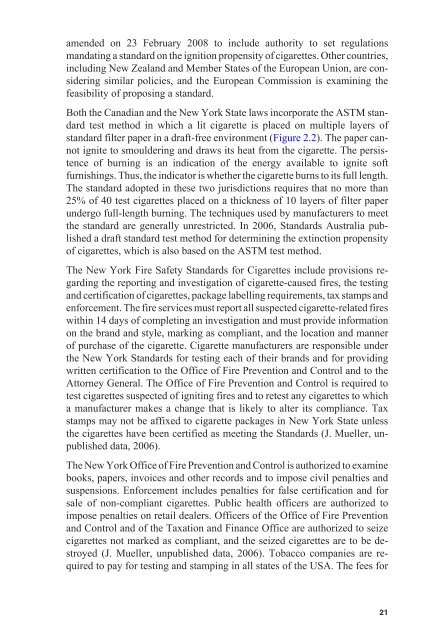The Scientific Basis of Tobacco Product Regulation - World Health ...
The Scientific Basis of Tobacco Product Regulation - World Health ...
The Scientific Basis of Tobacco Product Regulation - World Health ...
Create successful ePaper yourself
Turn your PDF publications into a flip-book with our unique Google optimized e-Paper software.
amended on 23 February 2008 to include authority to set regulations<br />
mandating a standard on the ignition propensity <strong>of</strong> cigarettes. Other countries,<br />
including New Zealand and Member States <strong>of</strong> the European Union, are considering<br />
similar policies, and the European Commission is examining the<br />
feasibility <strong>of</strong> proposing a standard.<br />
Both the Canadian and the New York State laws incorporate the ASTM standard<br />
test method in which a lit cigarette is placed on multiple layers <strong>of</strong><br />
standard filter paper in a draft-free environment (Figure 2.2). <strong>The</strong> paper cannot<br />
ignite to smouldering and draws its heat from the cigarette. <strong>The</strong> persistence<br />
<strong>of</strong> burning is an indication <strong>of</strong> the energy available to ignite s<strong>of</strong>t<br />
furnishings. Thus, the indicator is whether the cigarette burns to its full length.<br />
<strong>The</strong> standard adopted in these two jurisdictions requires that no more than<br />
25% <strong>of</strong> 40 test cigarettes placed on a thickness <strong>of</strong> 10 layers <strong>of</strong> filter paper<br />
undergo full-length burning. <strong>The</strong> techniques used by manufacturers to meet<br />
the standard are generally unrestricted. In 2006, Standards Australia published<br />
a draft standard test method for determining the extinction propensity<br />
<strong>of</strong> cigarettes, which is also based on the ASTM test method.<br />
<strong>The</strong> New York Fire Safety Standards for Cigarettes include provisions regarding<br />
the reporting and investigation <strong>of</strong> cigarette-caused fires, the testing<br />
and certification <strong>of</strong> cigarettes, package labelling requirements, tax stamps and<br />
enforcement. <strong>The</strong> fire services must report all suspected cigarette-related fires<br />
within 14 days <strong>of</strong> completing an investigation and must provide information<br />
on the brand and style, marking as compliant, and the location and manner<br />
<strong>of</strong> purchase <strong>of</strong> the cigarette. Cigarette manufacturers are responsible under<br />
the New York Standards for testing each <strong>of</strong> their brands and for providing<br />
written certification to the Office <strong>of</strong> Fire Prevention and Control and to the<br />
Attorney General. <strong>The</strong> Office <strong>of</strong> Fire Prevention and Control is required to<br />
test cigarettes suspected <strong>of</strong> igniting fires and to retest any cigarettes to which<br />
a manufacturer makes a change that is likely to alter its compliance. Tax<br />
stamps may not be affixed to cigarette packages in New York State unless<br />
the cigarettes have been certified as meeting the Standards (J. Mueller, unpublished<br />
data, 2006).<br />
<strong>The</strong> New York Office <strong>of</strong> Fire Prevention and Control is authorized to examine<br />
books, papers, invoices and other records and to impose civil penalties and<br />
suspensions. Enforcement includes penalties for false certification and for<br />
sale <strong>of</strong> non-compliant cigarettes. Public health <strong>of</strong>ficers are authorized to<br />
impose penalties on retail dealers. Officers <strong>of</strong> the Office <strong>of</strong> Fire Prevention<br />
and Control and <strong>of</strong> the Taxation and Finance Office are authorized to seize<br />
cigarettes not marked as compliant, and the seized cigarettes are to be destroyed<br />
(J. Mueller, unpublished data, 2006). <strong>Tobacco</strong> companies are required<br />
to pay for testing and stamping in all states <strong>of</strong> the USA. <strong>The</strong> fees for<br />
21

















